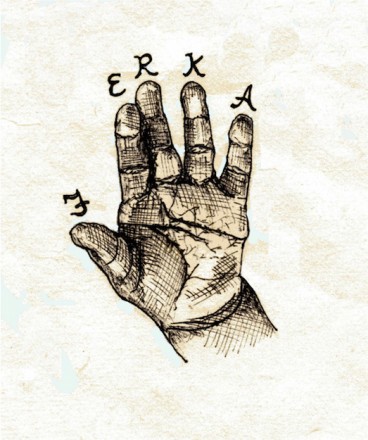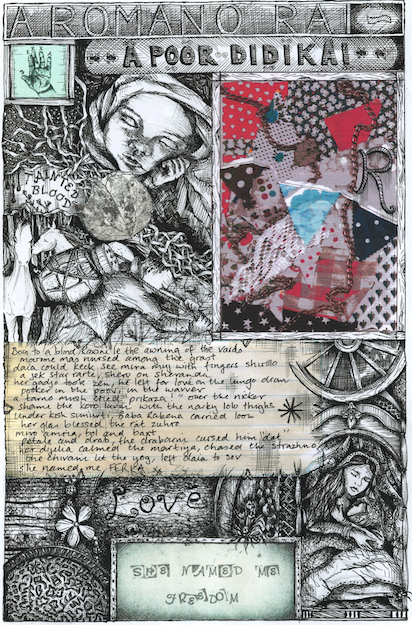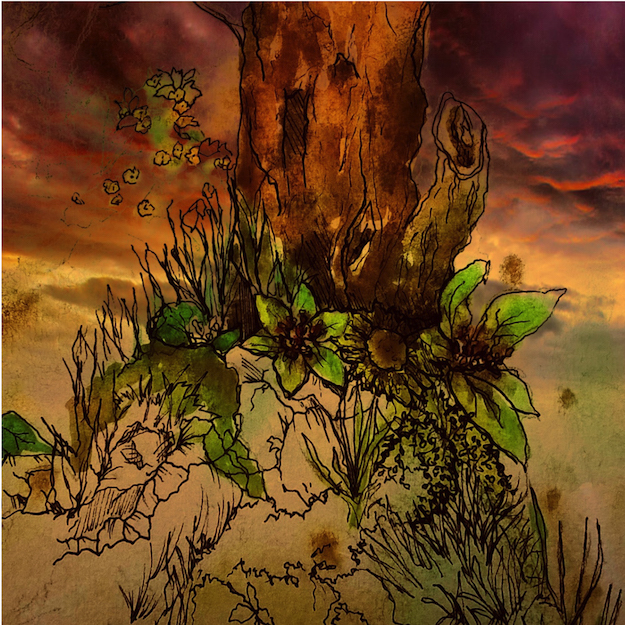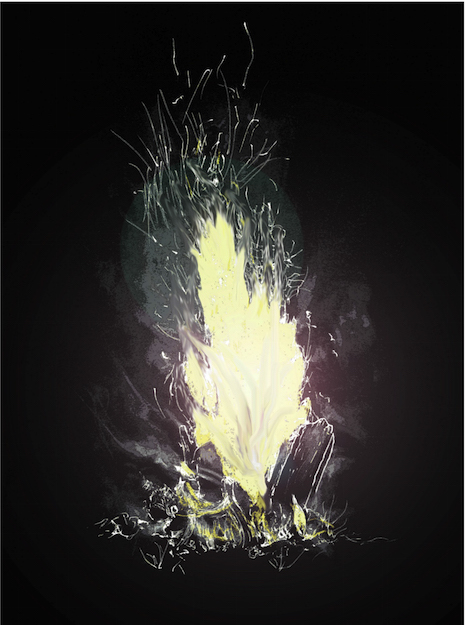JO DELYSE PACKWOOD: Finding Ferka
‘Gypsies had appeared in England around 1500, the latest stop on a journey that had begun in India, perhaps five centuries earlier, and thence progressed across the Middle East, the Balkans and continental Europe. They reached Germany in 1417, France in 1419 and Rome in 1422. Almost invariably they were seen (then as now) as ‘bad’. Their nomadic lifestyle threatened governments that required stability as a prerequisite of control; their features, their clothes, their occupations (fortune-telling, juggling, the selling of what Harman terms ‘novelties, toys and new inventions’) were seen as somehow ‘dangerous’. They stood apart and apart, as ever, meant alien.
They also possessed one more attribute: their own language, Romani (from the Romani Rom, a man, thus a gypsy). A hybrid tongue, based ultimately on Sanskrit (the root form of the Indo-European group of languages), it had picked up a range of loanwords as the Gypsies moved West: some Hebrew, some Greek, some German, something from most of the Romance languages.’ – Jonathon Green, ‘The Romany Rise’ (1999)
I was thinking about gypsies. I had been thinking about Roma for a while. Studying nature writing and ecopoetics, I had begun to consider the mystery surrounding my paternal great-grandmother in a new light. As I explored Worcester, the Malvern Hills, Ross-on-Wye and Abergavenny, my attention shifted from the concrete features of the landscape to the ephemeral, the temporal, the supernatural possibilities of nature writing. Though not directly researching Roma, I was reading Jonathan Bates’ biography of John Clare and The Song of the Earth, hiding from the wet autumn when not plucking boletes from the soil. One morning I woke to a voice. The voice was distinctive: slightly irked, yet melodic. His name is Ferka.
While I tend to write in free verse, Ferka’s insistence on melody and the phonemes of the dialect leads these Angloromani poems to evoke some of the imagery, stanzaic patterns, and metre of folksongs and ballads. For me, voice and poetic persona has thus been questioned; a tension which is difficult for me to express. Ferka echoes a lively stream of dialectical stories, and I continue to write them, unsure of how this work may be exhibiting my imaginative exploration of the past or how this corresponds with the other. These poems are, as Ferka is, primarily concerned with the landscape – the texture and light of the natural world – and our anxiety about our ‘space’ within it. There is some irony here, yet the material continues to be curiously evocative for me.
‘I seemed to step into him, or he stepped into me, and there were various things about him which were very impressive… He could write a lot better than I could… Although he could step out of me, and I could step out of him, quite easily, he was a very demanding task-master.’ – David Morley, interview with Simon Kövesi, John Clare Society Journal (July 2013)
“I’m a Romano rai, a poor didikai”
born to a blind rawni le the awning of the vardo
marime mas nursed among the grast
daia could keck see mira muj with fingers shirillo
a jek star ratti, sherro on sheranda
her gadjo took zen, he left for lové on the lungo drom
pooker in the poov, in the wavver
a tarno mush cried “prikaza!” over the nicker
shame the koro luvni with the narky lolo thighs
under kish simurti, Baba Rabena carried loon
her glas blessed the rat zuhro
miro amria, bol and baxt
petalo and drab, the drabarni cursed him “dat”
her dijilia calmed the martiya, chased the strazhno
the chivani lit the yog, left daia to sov
she named me Ferka
didikai a term of the Romanichal (the English branch of Romani or “Gypsies”) for travellers with mixed Romani blood; rawni lady; vardo wagon; marime unclean (spiritually); mas fresh meat; grast horses; daia mother; keck not; mira my (mas.); muj face/mouth; shirillo frozen; jek one; ratti night; sherro head; sheranda colourful goose down pillow; gadjo non-gypsy man; zen saddle; lové money; lungo drom long road; pooker talk; poov field; wavver forest; tarno young; mush man; prikaza omen/bad luck; koro blind; luvni tart/wench/whore; narky bad, risky, unpleasant; lolo red; kish silk; simurti moon; loon salt; glas voice; rat blood; zuhro pure; miro quiet; amria curses/spell; bol voice music; baxt good luck/fortune; petalo horseshoe; drab herbs; drabarni fortune teller; dat father; dijilia songs; martiya spirit of the night; strazhno danger; chivani head wise-woman; yog fire; sov sleep; Ferka European Romani name meaning ‘freedom’
Bewitchment
the rakli had kek diklem man
la fams gloved shom tud
the gurumni feril-pe lesti
in the peat of the poov
the drabarni collected vervain
at the new moon before dawn
the dry flowers lay beneath my pillow
between my head and the straw
avri the jigga I dikked parna kish
a putsi paddel la ezi
efta patrin, zhanglem, filled it
lakki was ferime to fármichi
rakli girl; kek not; diklem observed/noticed; man me; la her; fams hands; shom with; tud milk; gurumni cattle; feril-pe guarded/protected; lesti her; poov field; drabarni healer/fortune teller; avri from; jigga gate; dikked saw; parna white; kish silk; putsi drawstring pouch/purse; paddel over; la ezi her heart/soul/belly; efta seven; patrin leaves; zhanglem I knew; lakki she; ferime immune; fármichi witchcraft
Smithing
delling mira perra, shamblin’
paddel the clods of the chokni puv
coaxed to a bi-ashundo tan
duddeno ora was the lav
o bavval bashlo shom a clatter
gláso bashimos aver than
“mandi jall’d to puv a grai
all around the stuggas avri
a mush olv’d to mandi
to let mi avri”
chunnered ado a tamlo selta
limpedo gelbi mori, limpedo coke
coughs of tuv avri the susta
ruzlo vestas da bawro towba
sweat avri o takimos, o darimos
o Harápo chored me stor his striker
“mandi stripped off at him
and dell’d him in the yak!
and sap mi diro datchel!
can’t the mush kûr well!”
delling kicking; mira my; perra feet; paddel across; chokni puv clover/grassy field; bi-ashundo unknown; tan field; duddeno shiny/bright; ora coins; lav promise; o the; bavval air; bashlo rang; shom with; gláso voices; bashimos clanging; aver than somewhere else; mandi I; jall’d went; puv field/pasture; grai horse; stuggas houses; avri from/away/outside; mush man; olv’d came; mi me; chunnered pushed; ado into; tamlo dark; selta tent; limpedo bright/glowing; gelbi yellow; mori lump; tuv smoke; susta iron; ruzlo coarse; vestas hands; da and; bawro heavy, great; towba hammer; takimos heat; darimos fear; Harápo dark-skinned, giant and cannibal ogre in folk tales; chored took; stor for; dell’d hit; yak eye; sap snake; diro you; datchel having a shaggy appearance (of clothes); kûr steal
Joanna Delyse Packwood is a postgraduate student at the University of Warwick. In 2015 she self-published a poetry chapbook entitled Songs of Hounds and Frogs, for which she was awarded the Mercian Prize for Poetry. Collaborating with artist Mandy Purchase, she will produce a collection of Angloromani poetry later in 2016. Joanna has read poetry at Ledbury Poetry Festival, The MAC Birmingham and The Library of Birmingham. A podcast of the Gothic in Birmingham event at The Library of Birmingham can be heard here: https://gothicinbirmingham.wordpress.com/2015/06/19/podcasts-of-gothic-day-talks/
Artwork: Mandy Purchase is an artist specialising in hand drawn illustrations, digital manipulation and 3D. She is passionate about all art and design, and enjoys the cross over between Illustration and Fine Art. She has a passion for anything creative but especially anything involving the natural world, nature and creation.
WEBSITE: http://www.artalley.co.uk/
From the Junction Box
- Contributors and Links to Pages 1- 4
- Editorial to Issue 17: The John James / Chris Torrance Special
- Gavin Selerie: Marks Outside the Spa
- Elisabeth Bletsoe: Two Poems and a Miscellany for Chris Torrance
- Allen Fisher: Leeks and Leaves for Chris Torrance
- Ian Brinton: Notes from a Correspondence with Chris Torrance
- Elaine Randell: Chris, Barry and Me
- Ian Davidson: Tripping
- Peter Finch: Torrance
- Tilla Brading: Pieces for Chris Torrance




